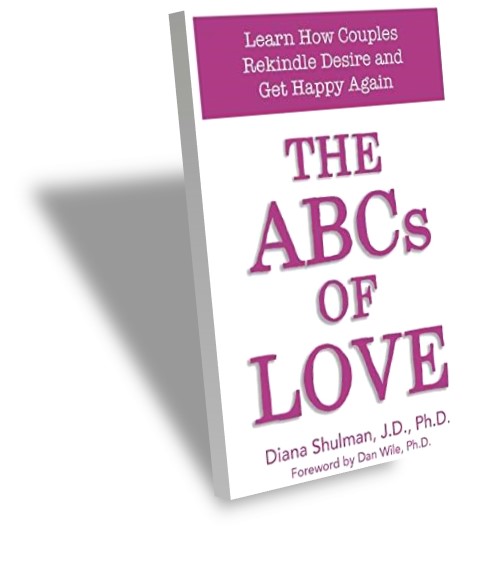What did you do the last time you were angry?
Did you withdraw into a cold, stony silence and fantasize revenge? Or did you become insulting and verbally abusive? Slam a door? Throw a glass? Hurt someone physically?
Or did you just move to tears and hopelessness?
The price we pay for out of control anger is steep. We destroy love and friendship, scar our children, turn off important business contacts, generate physical symptoms and undermine our own sense of well-being.
So what to do?
For starters, we need to make a distinction between angry behavior and the actual physical experience of anger—something that is not destructive but an important emotion that supplies critical data we all need to make intelligent decisions. The off-putting behaviors that we mistakenly label "anger" are not anger but our attempts to contain or avoid it. Anger as pure feeling is nothing more (and nothing less) than a particular pathway of physical sensations in the body. Outbursts or giving someone the silent treatment are NOT the feeling of anger but the “acting out” of anger.
If anger is so useful then why do so many of us have negative reactions to it?
If you're hysterical, it's historical
While we may not like to admit it, our families of origin have had an enormous impact on us—for better or worse—and it’s all about conditioning. Whatever comes out of the Chevy factory, looks and drives like a Chevy; whatever comes out of the Honda factory, looks and drives like a Honda; and whatever comes out of the Smith Family looks and acts like a "Smith"—meaning a person who's been taught to handle his/her feelings in a certain way.
In your family, maybe only Dad was allowed to be angry. So when you were angry you got uncomfortable, anxious and tried hard to be nice. In other words, you pushed away your anger—a reflexive fear-based response designed to avoid Dad's wrath. This defense—compliant avoidance—is a sad but practical strategy when you’re little.
Such responses are repeated through childhood until they become entrenched. We become phobic of our intense feelings the way some people are phobic about spiders or elevators. As emotion phobics we continue to avoid, hide and cover up our anger as though we’re still dependent children. At one point, these defenses were adaptive, but now as we push the feelings down, they pop back up with a vengeance—like a beach ball under water—in some unpredictable ways. What was originally anger has now morphed into a depression, anxiety, psychosomatic illness or a variety of self-defeating behaviors. And, because we never process the underlying rage, nothing gets resolved. We’re left on an emotional treadmill, treating others and ourselves as if we’re all characters out of our pasts. Whenever we do that, we can’t help but repeat the past.
Why can’t we break free?
The Importance of Experiencing Emotion
Actually, you can break free and make your anger and other emotions work for you. Anger should not be your captor but your liberator. It can give you clarity and motivation to protect yourself. But—unlike popular prescriptions of slapping band-aids on your overblown reactions—a thorough-going, emotion-oriented therapy painstakingly focuses on the
actual physical experience of anger in your body right in the session. Pivotal current and past life events are explored from an experiential—rather than an intellectual—perspective. You are encouraged to focus on bodily sensation connected with feeling rather than just thinking about it and presenting a narrative.
You may be wondering: "Even if I do experience anger, sadness, pain and guilt in my sessions, what good will it do? The past is the past. My boss, my family, my friends will continue to do all the same things that annoy me!"
Yes, of course they will! Other people are not going to change but once you really let yourself connect with your core emotions, process them on a deep level by letting them flow through your body, options open up, angles you’ve never considered enter your mind, new strengths begin to emerge. We get guidance from our feelings. Our emotions are an internal compass that help make us more rational decision-makers.
Does emotion-oriented therapy work?
Yes, it does. And surprisingly fast. An accumulation of
more than twenty years of videotaped research with clinical follow
up conducted at Harvard, Dalhousie, and McGill universities has
shown that experiencing warded-off emotion in this way—whether
it is rage, guilt or sadness—stops self-destructive behaviors
and relieves anxiety and depression.
Can you fix this by yourself?
If you could have, you would have. The reason you haven't is because there's a part of you that is afraid to revisit the old hurts and feel the old rage, pain, grief and guilt.
The price of turning away from our emotional selves is enormous. We can end up less successful, less effective, more isolated, more anxious, more depressed or even in physical pain. You don’t have to go through life stuffing your anger or erupting. If you work to get more comfortable with the bodily sensations that accompany all of your feelings—the goal of emotion-oriented therapy—you can be free of self-defeating behaviors and live the life you’ve always wanted.
Dr. Shulman can help you
manage your anger.
© 2024 Diana Shulman


 Even the misery that comes after the fight has a recycled feel to it. "We're stuck," many couples tell me. "We never get anywhere—even when we really try to sit down and talk about our problems."
Even the misery that comes after the fight has a recycled feel to it. "We're stuck," many couples tell me. "We never get anywhere—even when we really try to sit down and talk about our problems."

 We all know the value of a timely apology. Done well, it heals like an emotional analgesic. Done really well, its reparative speed seems magical. Done poorly, it falls flat, and we go from magical to meh.
We all know the value of a timely apology. Done well, it heals like an emotional analgesic. Done really well, its reparative speed seems magical. Done poorly, it falls flat, and we go from magical to meh. Most of us aren't schooled in the art of apologizing. We pick up a few bad habits from our families, flail around using trial and error, and then continue to stumble, wondering why our efforts don't do the job. If the vignette below describes one of your rough patches, it's time to give your “Sorry Skills” a tuneup.
Most of us aren't schooled in the art of apologizing. We pick up a few bad habits from our families, flail around using trial and error, and then continue to stumble, wondering why our efforts don't do the job. If the vignette below describes one of your rough patches, it's time to give your “Sorry Skills” a tuneup.
 Now the current stream of scientific research takes us further, showing that the "wetware" of the human brain contains mechanisms that allow neuronal connections to shift and change. This "rewirability" is basic to all learning, including un-learning patterns of behavior and thought in psychotherapy.
Now the current stream of scientific research takes us further, showing that the "wetware" of the human brain contains mechanisms that allow neuronal connections to shift and change. This "rewirability" is basic to all learning, including un-learning patterns of behavior and thought in psychotherapy.


 The older we get, the more we experience loss. We lose competitions, we lose jobs, we lose friends, we lose loved ones--in the end, we lose everything. There is no escape.
The older we get, the more we experience loss. We lose competitions, we lose jobs, we lose friends, we lose loved ones--in the end, we lose everything. There is no escape.
 Are you surprised to hear that the practice of law is among the most stressful occupations in America? When asked what factors most accounted for their work dissatisfaction, attorneys cited:
Are you surprised to hear that the practice of law is among the most stressful occupations in America? When asked what factors most accounted for their work dissatisfaction, attorneys cited:
 overwhelming at times, you don't need to suffer. Why not explore your concerns in a completely confidential, one-on-one setting?
overwhelming at times, you don't need to suffer. Why not explore your concerns in a completely confidential, one-on-one setting? medication were compared to the effects of treatment with both pharmacotherapy and talk therapy. The findings demonstrated that the combination of therapy and medication was superior and more effective than treatment with antidepressant medication alone. "Therapy with medication alone may not constitute optimal care for common mental disorders." World Psychiatry, 2014 Feb: 13 (1): 56-56.
medication were compared to the effects of treatment with both pharmacotherapy and talk therapy. The findings demonstrated that the combination of therapy and medication was superior and more effective than treatment with antidepressant medication alone. "Therapy with medication alone may not constitute optimal care for common mental disorders." World Psychiatry, 2014 Feb: 13 (1): 56-56.
 Division of Allied Health
Professionals, R.P. #41) has over 25 years of experience in working with both individuals and couples on a broad range of issues.
Division of Allied Health
Professionals, R.P. #41) has over 25 years of experience in working with both individuals and couples on a broad range of issues.